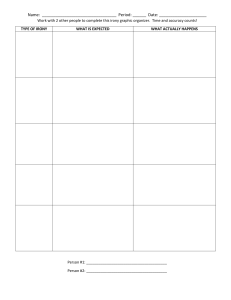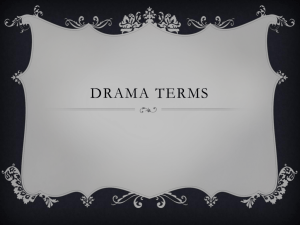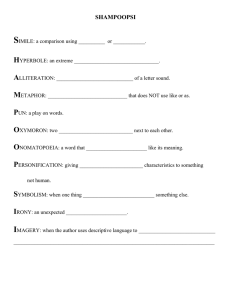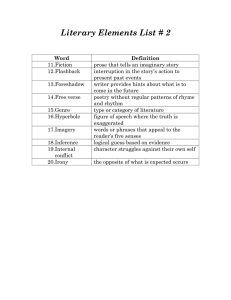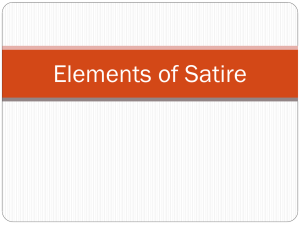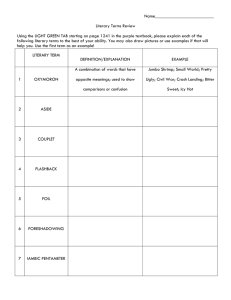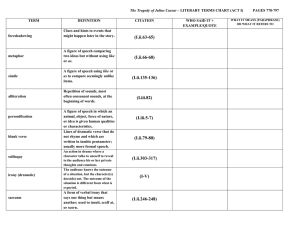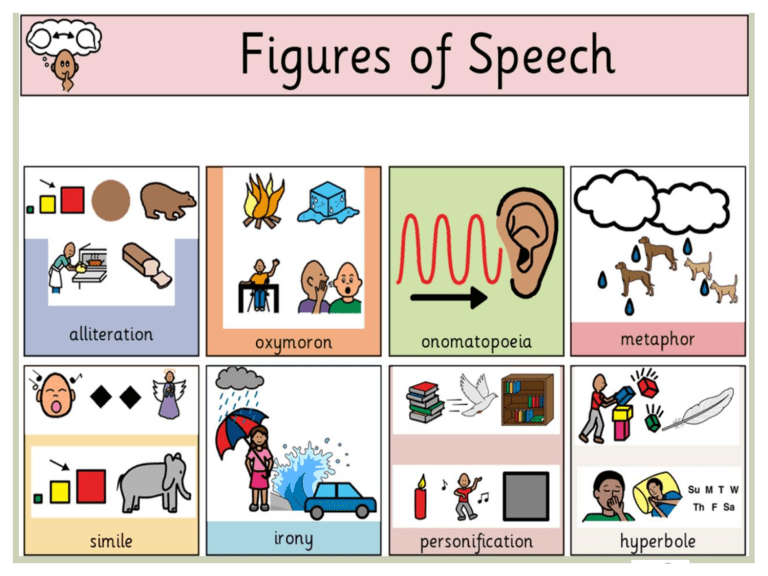
To err is human; to forgive, divine. (Alexander Pope) The world will little note, nor long remember, what we say here, but it can never forget what they did (Abraham Lincoln, The Gettysburg Address) That’s one small step for a man – one giant leap for mankind. (Neil Armstrong, 1969) For example, look at the parallel grammar of Example 1: the word “one,” followed by an adjective, a noun, and then the word “for.” This accentuates the opposites by setting them against a backdrop of sameness – in other words, two very different ideas are being expressed with very, very similar grammatical structures. To recap: antithesis has three things: Two or more parts Reversed or inverted ideas (usually) parallel grammatical structure Antithesis can be a little tricky to see at first. To start, notice how each of these examples is separated into two parts. The parts are separated either by a dash, a semicolon, or the word “but.” Antithesis always has this multi-part structure (usually there are two parts, but sometimes it can be more, as we’ll see in later examples). The parts are not always as obvious as they are in these examples, but they will always be there. Next, notice how the second part of each example contains terms that reverse or invert terms in the first part: small step vs. giant leap; human vs. divine; we say vs. they do. In each of the examples, there are several pairs of contrasted terms between the first part and the second, which is quite common in antithesis. Extrapolate- /ɪkˈstræp.ə.leɪt/ to guess or think about what might happen using information that is already known: You can't really extrapolate a trend from such a small sample. to use existing information to discover what is likely to happen or be true in the future: Speaking about global warming, she said that time periods of 15 and even 30 years are too brief to extrapolate changes in climate patterns. Hyperbole (pronounced ‘high-purr-bo-lee’) is a figure of speech in which an author or speaker purposely and obviously exaggerates to an extreme. It is used for emphasis or as a way of making a description more creative and humorous. It is important to note that hyperbole is not meant to be taken literally; the audience knows it’s an exaggeration. -That suitcase weighed a ton!-Spring break will never come.-“I haven’t seen you in a million years!” American poet W.H. Auden writes in “As I Walked Out One Evening,” I’ll love you, dear, I’ll love you Till China and Africa meet, And the river jumps over the mountain And the salmon sing in the street. Born on a mountain top in Tennessee Greenest state in the land of the free Raised in the woods so he knew ev’ry tree Kilt him a be ‘are [bear] when he was only three Davy, Davy Crockett, king of the wild frontier -The Ballad Of Davy Crockett LyricsThe audience isn’t supposed to believe that this character truly knew “every tree” or that he literally killed a bear when he was “only three.” Instead, hyperbole is used to exaggerate Davy Crockett’s frontier experience and make him seem larger than life. Hyperbole is a frequently used literary device in tall tales, legends, and folk stories. The audience is aware that such claims are to emphasize the traits of the characters and not to be taken literally. Hyperbole *I’m so hungry that I could eat a horse. *That purse looks like it cost a million dollars. *I Love You to the moon and back. *He feels buried under a mountain of work. *I’m dying of thirst. *That dog is the cutest thing alive. *She loves him more than life itself. *He heard an ear-splitting shriek. *This race is going to be the death of me. *I’m so tired that I could sleep for a week. *That song is the worst thing I have ever heard. *This room is so cold that I’m getting hypothermia. *I am addicted to skateboarding. *She is more beautiful than the moon and stars. Hyperbole in Harper Lee's To Kill a Mockingbird The story of To Kill a Mockingbird takes place during the Great Depression in Maycomb County, Georgia: a sleepy town where nothing much ever happens: --------People moved slowly then. They ambled across the square, shuffled in and out of the stores around it, took their time about everything. A day was twenty-four hours long but seemed longer. There was no hurry, for there was nowhere to go, nothing to buy and no money to buy it with, nothing to see outside the boundaries of Maycomb County.----------------------------------------- Amble-to walk at a slow relaxed speed Hyperbole in Harper Lee's To Kill a Mockingbird -People moved slowly then. They ambled across the square, shuffled in and out of the stores around it, took their time about everything. A day was twenty-four hours long but seemed longer. There was no hurry, for there was nowhere to go, nothing to buy and no money to buy it with, nothing to see outside the boundaries of Maycomb County.- Lee's use of hyperbole to describe the town—nothing to buy, no money to buy it, nowhere to go—links the difficult economic situation to the townspeople's pace of life, as well as to the insular, isolated nature of this community. Hyperbole in John F. Kennedy's 1962 Nobel Prize Dinner Speech In his remarks at a dinner celebrating the 1962 Nobel Prize winners, JFK paid them the following hyperbolic compliment: ---------I want to tell you how welcome you are to the White House. I think this is the most extraordinary collection of talent, of human knowledge, that has ever been gathered together at the White House, with the possible exception of when Thomas Jefferson dined alone.---------- The exaggeration in Parker's Back by Flannery O'Connor helps to set up the characterization. --------"The skin on her face was as thin and drawn as tight as the skin of onion and her eyes were gray and sharp like the points of two picks.“---------------------------------------_______________________________________________ In this example from Banner in the Sky, James Ramsey Ullman shows how dynamic contrast can heighten emotion. -------"It was not a mere man he was holding, but a giant; or a block of granite. The pull was unendurable. The pain unendurable.“---------------------------------------------------Endure-to suffer something painful or uncomfortable, usually without complaining A great example of hyperbole in literature comes from the narrator's opening remarks in the American folktale Babe the Blue Ox. It comically gets across just how cold it was. ----------"Well now, one winter it was so cold that all the geese flew backward and all the fish moved south and even the snow turned blue. Late at night, it got so frigid that all spoken words froze solid afore they could be heard. People had to wait until sunup to find out what folks were talking about the night before.“--------------------------------------- Old Times on the Mississippi by Mark Twain Old Times on the Mississippi by Mark Twain contains an example of hyperbole to dramatize a feeling of helplessness. ----------"I was helpless. I did not know what in the world to do. I was quaking from head to foot, and could have hung my hat on my eyes, they stuck out so far.“-------- Understatement An understatement is a figure of speech employed by writers or speakers to intentionally make a situation seem less important than it really is. For example, you win 10 million dollars in a lottery. When you tell a news reporter “I am delighted,” you are making an understatement. Similarly, suppose a team loses to its opponent 50 to 0 in a soccer match, and the captain of the team says in a post-match ceremony, “We did not do well,” it is an understatement because he is trying to decrease the intensity of the loss. “Deserts are sometimes hot, dry, and sandy.” – Describing deserts of the world. “He is not too thin.” – Describing an obese person. “It rained a bit more than usual.” – Describing an area being flooded by heavy rainfall. “It was O.K.” – Said by the student who got the highest score on the test. In Salinger’s Catcher in the Rye, Holden Caulfield says: ----“I have to have this operation. It isn’t very serious. I have this tiny little tumor on the brain.”----Having a tumor in the brain is a serious issue, which has been understated in this excerpt. An understatement is a tool that helps to develop other figures of speech, such as irony and sarcasm, by deliberately decreasing the severity of a situation, when an intense response is expected by the listeners or the readers. Foil Characters A foil refers to any two characters who are “opposites” of each other. A foil refers to any two characters who are “opposites” of each other. These oppositions are often conceptual in nature: one character may be even-keeled and mild, like Benvolio in Romeo & Juliet, while another character may be quicktempered and pugnacious, like Tybalt. According to Oxford: Irony is the use of words that say the opposite of what you really mean, often as a joke and with a tone of voice that show this. What Merriam-Webster's Advanced Dictionary says: Irony is the use of words that mean the opposite of what you really think especially in order to be funny. Irony (pronounced ‘eye-run-ee’) is when there are two contradicting meanings of the same situation, event, image, sentence, phrase, or story. In many cases, this refers to the difference between expectations and reality. Verbal Irony Irony in which a person says or writes one thing and means another, or uses words to convey a meaning that is the opposite of the literal meaning. Julius Caesar by William Shakespeare (1599): In one famous scene of this Shakespeare play, Mark Antony notes that "Brutus is an honorable man" despite well knowing that the story's main character Brutus could be tied directly to Caesar's assassination. His words do not reflect his true feelings. In Beauty and the Beast, an animated Disney movie, Belle refuses to marry Gaston by saying "I just don't deserve you!” What a great day: I crashed my car and lost my winning lottery ticket! ______Here, the speaker is using “great” ironically. They’ve actually had a terrible day! But they say the opposite of what they mean to draw attention to the difference between a “great” day and the one they really had._____________ My own dear love, he is strong and bold And he cares not what comes after. His words ring sweet as a chime of gold, And his eyes are lit with laughter. He is jubilant as a flag unfurled— Oh, a girl, she’d not forget him. My own dear love, he is all my world,— And I wish I’d never met him. My own dear love, he is strong and bold And he cares not what comes after. His words ring sweet as a chime of gold, And his eyes are lit with laughter. He is jubilant as a flag unfurled— Oh, a girl, she’d not forget him. My own dear love, he is all my world,— And I wish I’d never met him. Parker utilizes situational irony as a literary device to set up an incongruity between what the reader expects to happen in the poem and what actually does happen. In this case, the poem’s title and the poet’s words of praise and adulation set the reader up to expect that the poem is an expression of the poet’s deep and steadfast love. Instead, the final line of the first stanza presents a situation that is entirely the opposite of what is expected; the poet states that she wishes she had never met the man that she claims as her “own dear love.” This short story by O. Henry is considered one of the best examples of situational irony in literature. It has been re-told and adapted as an example of giving and sacrifice, especially during the Christmas season. In the story, a young married couple with little money decide to sell what is most precious to themselves in order to purchase something valuable for the other. Della, the wife, sells her long beautiful hair to buy her husband Jim a watch chain. In turn, Jim sells his watch chain to buy Della combs for her hair. Since neither of them any longer possess the items for which their gifts are intended, in the end the gifts are essentially worthless. This creates situational irony in terms of the gift exchange and also the level of their sacrifice for each other. Examples of Situational Irony in Literature: 1. In "The Gift of the Magi," by O. Henry, the husband sells his watch to buy his wife combs for her hair and the wife sells her hair to buy her husband a chain for his watch. 2. In the Rime of the Ancient Mariner by Coleridge, the men are surrounded by an ocean of water, but they are dying of thirst ("Water, water everywhere, nor any drop to drink.") 3. "The Story of an Hour," by Kate Chopin tells of a wife who learns that her husband is dead. She feels a sense of freedom as she thinks about a life without restriction. Then, he returns (he wasn't dead after all) and she dies of shock. 4. In "The Necklace" by Guy de Maupassant, a woman borrows what she thinks is a costly necklace from a friend and loses it. She and her husband sacrifice to replace it, only to learn years later that the necklace was a fake. Dramatic irony is an important stylistic device that is commonly found in plays, movies, theaters, and sometimes in poetry. Storytellers use this irony as a useful plot device for creating situations in which the audience knows more about the situations, the causes of conflicts, and their resolutions before the leading characters or actors. That is why readers observe that the speech of actors takes on unusual meanings. For instance, the audience knows that a character is going to be murdered, or will make a decision to commit suicide; however, one particular character or others may not be aware of these facts. Hence, the words and actions of characters would suggest a different meaning to the audience from what they indicate to the characters and the story. Thus, it creates intense suspense and humor. This speech device also emphasizes, embellishes, and conveys emotions and moods more effectively. Example #2: There’s Something About Mary (By Jonathan Richman) “I’ve done it several times before.” “It’s no big deal.” --Jonathan Richman’s comedy movie, There’s Something About Mary, contains several instances of dramatic irony. -For instance, when Ted thinks that the police have arrested him for picking up a hitchhiker, the audience knows that the police are actually interrogating him about a murder. Therefore, when Ted delivers these seemingly-innocuous lines, it is comedic to the audience. Innocuous-/ɪˈnɒk.ju.əs-completely harmless (= causing no harm):Some mushrooms look innocuous but are in fact poisonous. Example #3: Othello (By William Shakespeare) “Othello: I think thou dost. (I think you are.) And for I know thou ‘rt full of love and honesty And weigh’st thy words before thou giv’st them breath…” This is another very good example of dramatic irony, when Iago manipulates Othello, and Othello puts his faith in Iago as an honest man. However, Iago is plotting against him without his knowledge. Again, the audience knows that Iago is deceiving, but Othello does not. Pun A pun is a literary device that is also known as a “play on words.” Puns involve words with similar or identical sounds but with different meanings. Their play on words also relies on a word or phrase having more than one meaning. Puns are generally intended to be humorous, but they often have a serious purpose as well in literary works. Apocalypse soon Coming our way Ground zero at noon Halve a nice day. “Corduroy pillows are making headlines.” [Alice:] ‘You see the earth takes twenty-four hours to turn round on its axis–‘ ‘Talking of axes,’ said the Duchess, ‘chop off her head!’ Ground Zero-a starting point or base for an activity. Blank verse is a literary device defined as un-rhyming verse written in iambic pentameter. In poetry and prose, it has a consistent meter with 10 syllables in each line (pentameter); where, unstressed syllables are followed by stressed ones, five of which are stressed but do not rhyme. It is also known as “un-rhymed iambic pentameter.” Iambic In a line of poetry, an ‘iamb’ is a foot or beat consisting of an unstressed syllable followed by a stressed syllable. Or another way to think of it it a short syllable followed by a long syllable. For example, deLIGHT, the SUN, forLORN, one DAY, reLEASE. English is the perfect language for iambus because of the way the stressed and unstressed syllables work. (Interestingly, the iamb sounds a little like a heartbeat). Pentameter ‘Penta’ means five, so pentameter simply means five meters. A line of poetry written in iambic pentameter has five feet = five sets of stressed syllables and unstressed syllables Putting these two terms together, iambic pentameter is a line of writing that consists of ten syllables in a specific pattern of an unstressed syllable followed by a stressed syllable, or a short syllable followed by a long syllable. Shakespeare’s sonnet 18 starts ‘Shall I compare thee to a summer’s day?’. This line of poetry has five feet, so it’s written in pentameter. And the stressing pattern is all iambs (an unstressed syllable followed by a stressed syllable): Shall I | compARE | thee TO | a SUM | mers DAY? da DUM | da DUM | da DUM | da DUM | da DUM Features of Blank Verse Blank verse poetry has no fixed number of lines. It has a conventional meter that is used for verse drama and long narrative poems. It is often used in descriptive and reflective poems and dramatic monologues — the poems in which a single character delivers his thoughts in the form of a speech. Blank verse can be composed in any kind of meter, such as iamb, trochee, spondee, and dactyl. Is imagery a literary device? Absolutely! Imagery can be both literal and figurative, and it relies on the interplay of language and sensation to create a sharper image in your brain. Sight imagery: The tree spread its gigantic, sun-flecked shoulders. Sound imagery: The forest was hushed, resounding with echoes of the tree’s stoic silence. Touch imagery: The tree felt smooth as sandstone. Taste imagery: The tree’s leaves tasted bitter, like unroasted coffee beans. Smell imagery: As we approached the tree, the air around it smelled crisp and precise.
